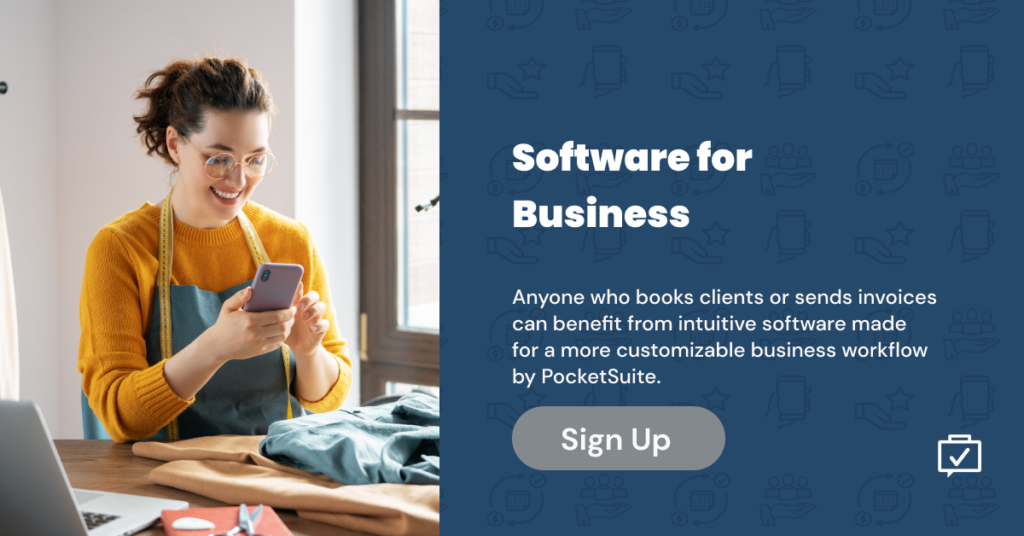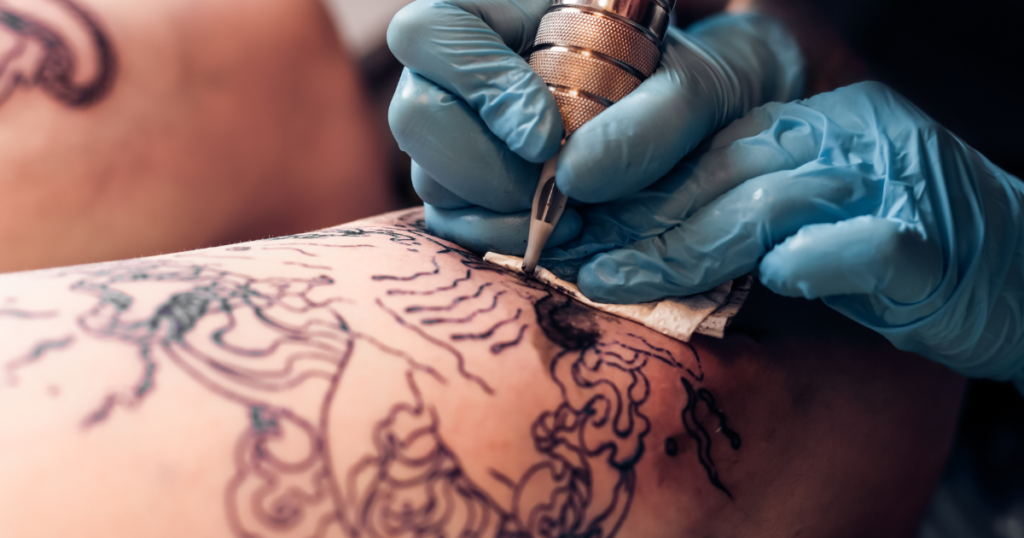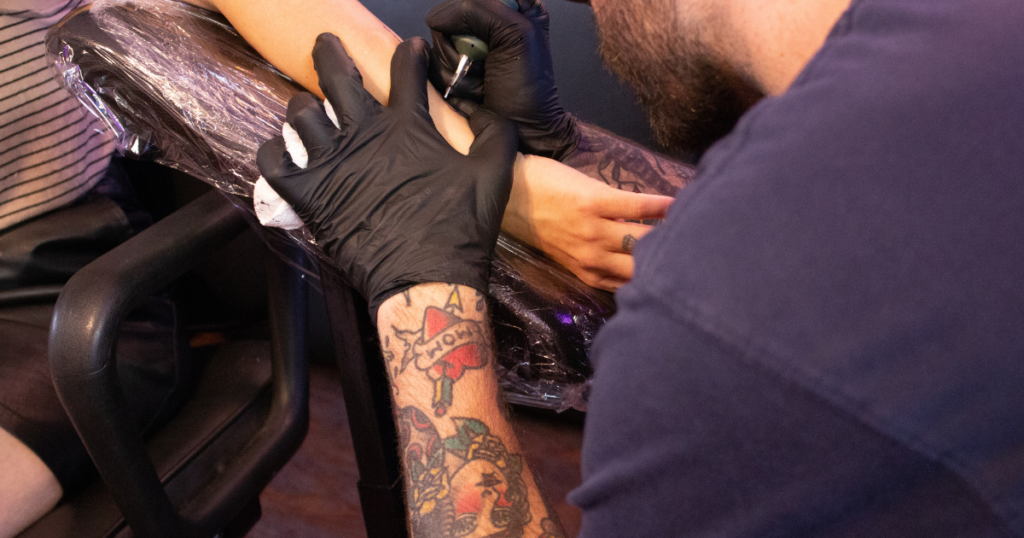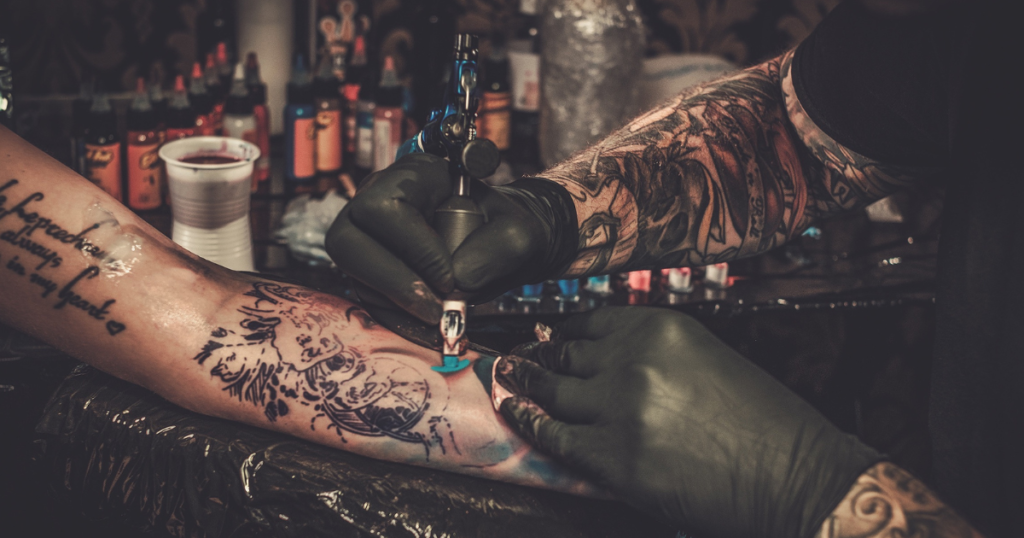Building a Million Dollar Tattoo Business with Sean Dowdell
Sean Dowdell started in the tattoo and piercing industry as a way to make money when his band wasn’t on tour. Decades later, his business Club Tattoo is a multi million dollar business with locations in Arizona and Las Vegas Nevada and he has published two popular books on building a business. We talk about how he built his business empire with grit, hard work, and careful risk taking. Listen to find out why he had to stop selling his most popular items to truly succeed with his business goals.
Watch or listen to the full interview through any of these links and scroll down for a full interview transcript!
Listen on:
Follow PocketSuite:
Follow Sean Dowdell:
Full Interview Transcript:
PocketSuite:
Welcome everyone to the Booked Solid Podcast, the place for anyone building a business with clients. Today we have a very exciting guest for you. His name is Sean Dowdell. He is the founder of Club Tattoo, a kind of famous shop out of a Arizona and Las Vegas. And he’s written two books, one that got a lot of buzz a few years ago called Tattooed Millionaire, about struggling against the odds and building a great business. And then he has a new book out just the last year called Brand Renegade. So thank you so much for joining us today, Sean.
Sean Dowdell:
Thanks for having me on. I appreciate it.
PocketSuite:
So for those of our audience who don’t know you or the world of tattoo, can you start with a little bit about your background, where you came from and how you found tattooing?
Sean Dowdell:
So I was born and raised in Phoenix, Arizona, kind of a product of the early, late 70s, early 80s. And I got into music when I was about 12, 13 years old. Started playing drums when I was around 18, started my first band and leveraged into our second band, which became a band called Grey Daze and had some regional success with that. Had a couple of record deals and a couple songs on the radio and were doing quite well. And we ended up touring, these little three to five date tours, like we called them satellite tours back in the early 90s. And while the band was having success, we would come home to basically no money and have our bills to pay. So the bass player, Mace and I came up with an idea to start our own business so that we could operate it and make money while we were out on the road with the band.

That was the original intention of my first brick and mortar business Club Tattoo. And we had leveraged relationships that we had with some tattoo artists that we knew back in the 90s, and we had been promoting this tattoo night at a nightclub called The Electric Ballroom. And when we opened it up, we leveraged our band success to drive traffic to Club Tattoo, and it worked out really well early on. And from our, I guess our local notoriety people came in and started recognizing Club Tattoo as a solid tattoo and piercing studio.
And then from there, the band ended up breaking up in 1998. And then I kind of, I’ll give you the cliff notes version of this, over the next period of the next year or two, I really started to pour my entirety into Club Tattoo and became, I guess at that point, a true entrepreneur where I started looking at the actual business metrics and understanding how the business worked. What drove the traffic, what our clients wanted, what our employees wanted, what our staff needed, and really started to understand the business in a macro view and then really started to drive the success of the company from that point.
PocketSuite:
That’s really cool. So the journey for you, it sounds like really started in that you had built up a, what they would call today a platform first where you had a following of people from the band and then that helped you start your business. Do you have any advice for people who are trying to build up their platform for the first time? Maybe they’ve got a TikTok account or they’ve got their first 10,000 followers on Instagram because they’re making amazing tattoo art of how you kind of thread that needle of turning a following into a business?
Sean Dowdell:
Well, I think there’s several different ways to approach it. If you’re a tattoo artist, those platforms mean a lot to you because they get you noticed and give you exposure to maybe people who wouldn’t normally be looking for you, but they have similar interests in what it is you do. So you get an introduction to those people through those platforms. There’s some great tattooers out there that have just done a phenomenal job at building their own personal brand through the use of those social platforms like Facebook and mostly Instagram and TikTok, especially the last two years. Our brands are strong on TikTok and Instagram and Facebook, but it’s not one of our primary traffic drivers. We use it more of a branding exposure opportunity for us rather than a specific traffic driver where we use things like radius and proximity advertising to drive traffic for that stuff.
But those platforms give us exposure in a general sense to our brand and what it is we do. And then if people want to dive further, they can come in and do that. So the advice I would give if we’re talking about a brick and mortar type business, use the platforms as an exposure opportunity first and then a traffic driver second. If you’re an individual creator, I think the exposure component of that is equally as important, but it really is your traffic driver and word of mouth at that point too. So two different ways to look at it as an individual or as a company or a brick and mortar. That’s the way I approach it, at least. That’s the way I look at it.
PocketSuite:
Okay. That’s really interesting. So getting back to the storyline though, when you really started to pull up your sleeves and commit to being an entrepreneur running Club Tattoo, what were some of the learning experiences that you had going from kind of musician looking to make money on the side to full-time trying to build your dream business?
Sean Dowdell:
Oh man, I could answer this 50 different ways. Some of the most important lessons I learned early on was that, and it took me a few years to figure it out, is that I thought I was 21, 22 years old when I started my company and I thought everybody in my company were my friends because I treated them like friends. But loyalty wears thin, especially when you’re talking about money. And you start to realize that people have their own personal interests, which doesn’t make them bad, but you have to be conscious that those elements exist in your company.

And you can be friendly as a business owner to your staff, but you have to be very careful about being friends with your staff because then it makes the boss, employee relationship very difficult to manage and navigate. And I think it can cause confusion not only for your staff, but for you as an owner and you start treating people as friends when you should be having that employee relationship. But at a given time, it’s very difficult to discern what to be at what time. So I think that’s a first. As a small business owner, the first thing to know is that your staff is your staff first and your friends second. And as a young man, that was a very difficult thing for me to learn.
PocketSuite:
Hey, let’s talk about that very directly. Because I think it’s an important growth moment that a lot of entrepreneurs have because you have multiple locations in Arizona and Las Vegas today. I took a look. Look up Club Tattoo, by the way. It’s great. Artists have amazing portfolios and clearly you encourage them to have different styles, which is really cool. But as you were growing your group of artists, what would be an example of a boundary that you would make as an employer that you might not draw as a friend? How did you start creating those different kinds of relationships as employer, employee and what not to do as a friendship relationship that someone might abuse in a business context?
Sean Dowdell:
Yeah, for the first thing that comes to mind, thinking back to those early years was letting the excuses get in the way of your judgment as a boss. When somebody says, oh, I can’t make it in today 20 minutes before their shift because I got to go get my driver’s license renewed or whatever. It’s like as a friend, I’d be, oh, okay, that’s fine. Come in. Now, I’d be like, time out. You knew you were supposed to be here at a specific time. You can do those things on your day off, before or after your shift, or you can ask for a day off and get your shift covered. So I couldn’t differentiate what was a good excuse and a reasonable excuse back then between friends and as a business owner.
Now it’s very easy for me, and maybe some people would think that it’s maybe a colder approach, but I think it also, it gives your staff reasonable standards to know what to expect from their leaders. They’re not going to see these favoritism yeah, because you’re friends with this guy, he gets to do this thing and you’re not friends with this girl, so she doesn’t get to do these things. And you’re able to create this baseline standard where everybody has to meet it and is treated equally. And I think that makes for a much better broader work environment for your staff.
PocketSuite:
Right. So when you’re making the transition, some of the things you have to do, drawing boundaries might seem cold, but they actually create a warmer, more collegiate atmosphere.
Sean Dowdell:
Absolutely. And your staff knows exactly what to expect on the front end.
PocketSuite:
That’s really cool. Any more examples like that? I thought that was kind of gold.
Sean Dowdell:
Ooh. In our industry, especially in the 90s, it was kind of a CD underground industry where people were trading motorcycle parts or free rent in their apartment, and then they would be trading the service that I as a business owner would be giving my portion of that business to these employees personal wants and needs. And it had nothing to do with our business and it had to do with their either selfish outlook or inability to create business for themselves in the first place. So for me, I had to draw a line, and this happened pretty quickly within the first year or two where I realized, wait a minute, as a business owner, I’m getting taken advantage here. This guy’s trying to get his rent paid by tattooing his landlord for free. Yet I as a business owner, I’m losing that artist’s time on the floor. I’m losing the opportunity to sell this person a tattoo. I’m losing our 50% commission or whatever the commission base was off of that.
So those were standards as well that we had to put in and draw really hard lines and say, no, we are not going to trade motorcycle parts for tattoos. We’re a real business. This is a real company doing real things. And you can’t go into Louis Vuitton and trade motorcycle parts or free rent for a purse or Cartier for a bracelet because they just don’t operate like that. So I had to start treating our business like a real business and get away from those, in my opinion, those underground business practices.
PocketSuite:
Right. Right. Having things above board, having your policies set and making sure it makes sense for the overall business.
Sean Dowdell:
Yeah.
PocketSuite:
So making that lifestyle transition from rockstar to tattoo club business owner, what were some of the trade-offs? What did you enjoy more about your new life? What did you give up?
Sean Dowdell:
Well, for the first, my wife and I always joke, the first 15 years of our marriage, we traded the youth and freedom of the weekend barbecues and the trips and stuff like that to try to build our company and build our little empire that we were working so hard at. We were working 70 hours a week for 15 straight years, and I still work 60 hours a week because I love it. It’s a passion for me. So that was an initial trade-off. When I was 20 years old, I could just load up the car on a Thursday and go to San Diego for two days just because I wanted to. At age 25, 30, I couldn’t do that. I had this right or wrong, I put this massive amount of responsibility on my shoulders that I felt like my employees and my staff and my team were always relying on me and I had to lead by example as far as how hard I was willing to work.

So I never took shortcuts and that was something I sacrificed and my wife sacrificed as well for the first 15 years of our marriage and our business together. As I get a little bit older, I’m 49 now, I’m able to travel the world a lot more and I have a little bit of wealth built up. But all that stuff came from hard work and sacrifice in the early years. And I think some of the things that are missing from the younger generation right now, and I hate to sound like my father, but I feel like it’s true, is the work ethic on a grand scale is definitely missing. But the expectations of immediate gratification and entitlement seem to be far greater than I remember. I remember being grateful for the opportunity to earn my way to get to certain levels and get to certain things.
And I understood that there was a process I had to do and sometimes it was tedious and took a long time and I had to look at, okay, I want to buy my first house. And my wife and I were saving money in our sock drawer literally for two years until we had enough to put a down payment on our house. And it seems like nowadays these expectations of, well, I want this, I deserve it, I should be able to have it right now. And I never managed my life that way or my business that way. I also think it’s one of the reasons why you see such young people getting into such massive amounts of debt. And I never did that.
I was always scared to death of debt, product of a young childhood in the Jimmy Carter years of America where credit and interest rates were through the roof and you found yourself underwater very quickly if you had large debt service. So I just remember that, being scared to death, this depressionist economic mentality I had, especially in my, I still have it actually, and I think it’s served us very well. Being frugal when you need to be, spending when you need to be, when it makes sense, and trying to make sure that you’re thinking of a long term goal in saving money. I think it’s a lost art right now.
PocketSuite:
Now that’s a good question because personal debt obviously can ruin lives, but a lot of people build their businesses by getting out business debt, which is very different. Did you manage to build your business without that or did you use that?
Sean Dowdell:
Some of our expansion was done through debt. One of the first things I can think of was back in 2004 we opened, or 2003, we opened up our second studio in Tempe, Arizona, and then a year later we bought the commercial property that it was sitting on. And that was a scary thing because it was $400,000 for us at the time. And since it was a commercial loan, I think we had to put down 20 or 25%. So we had to save up not only the 80 or $85,000 we had to put down against the loan, but we had a $100,000 worth of renovations we had to do with it. So we took out $100,000 business credit line to do the renovations, saved up the cash for the down payment. And I was so scared of that.
And I remember looking back thinking that the payment was like $600 a month and now the building is worth like $6 million. So it was one of the best investments we ever did, and it served our company very well. But at the time I just remembered being scared to death. So we took on what I would say was calculated risk, and those were some of the early things. But later on we took on a lot heavier risks and sometimes we lost that bet. When we opened our first studio in Las Vegas, Thora and I put up almost $700,000 in cash and we borrowed a million dollars from the bank, and that was scary. And that was right in the middle of 2008 when the world was melting down. But we had been working on it for five years to that point. So,
PocketSuite:
Wow.
Sean Dowdell:
We just saw it through and opened up in the first quarter of 2009 and thank God we hit a home run with that was our store at Planet Hollywood Miracle Mile Studio, Miracle Mile Shops. And that store does phenomenal, and we’ve since paid off that million dollars and that store does absolutely phenomenal for us. It’s our flagship store. But out of that came a little bit of arrogance and I write about that in Tattooed Millionaire and Brand Renegades where we have our blinders on thinking that we’re kind of invincible and we had this unbeatable business model. We’d be successful no matter where we went.

So we opened a store in San Francisco at Pier 39 and borrowed another million dollars and ended up having to close it after three years and lost a million dollars in debt that I still had to pay, but lost a million dollars in cash that Thora and I put up. So that was a gigantic learning curve, but once again, we had taken these risks, but at the same time, I don’t know, a lot of small business owners like in our case where they could have closed the business, still taken on a million dollars worth of debt and survived to live another day.
PocketSuite:
That’s fantastic. So what is your advice for someone with a service and as your job booking clients who wants to expand, already has that healthy fear of personal debt, avoids it for using business loans to expand wisely?
Sean Dowdell:
Oh, man. So debt is a very long subject. I think debt is important to leverage correctly, but as a young entrepreneur, it’s very difficult to understand what is the proper leverage for your business. Because I have a lot of young entrepreneurs that come up and they think their biggest problem is a lack of money, and most of the time it’s not. They’re two or three problems away from that. And I tell them, I said, Thora and I write about this in our book Brand Renegades where we talk about affordable mistakes. As a young entrepreneur, if somebody would’ve given me $100,000, I probably would’ve spent it in all the wrong areas and still had that debt service to pay. I wouldn’t have understand what it was I needed to borrow money for in the first place. And I think that’s one of the biggest mistakes young entrepreneurs make is they borrow money for the wrong reason.
So that being said, if you really understand your business and your growth potential of what you can leverage the debt for and it has a very specific purpose, then I think it’s okay. I think in a general sense, expansion debt is okay to take on. I think in a micro sense inventory, unless it’s in the very short term and what I’m talking about three to six months debt service for inventory voids. So cashflow issues where you need to fund inventory. If it’s not for that purposes and you’re thinking this is going to fund my entire business model, you’re adding upwards of 10 to 15% sometimes to your bottom line to do that. So I don’t think that that’s a very smart thing to do unless it’s a very short term debt cycle that you’re talking about for inventory purposes.
PocketSuite:
Cool. It sounds like your recommendation is use it for clear business growth opportunities, like a new location.
Sean Dowdell:
In a macro sense.
PocketSuite:
In a macro.
Sean Dowdell:
Clearly you have situations that don’t meet that idea, but I think if you really have to understand debt, it’s pros and cons and it’s tough as a young entrepreneur because you think your problem is, I just don’t have enough money to do everything I want to do. Well, you’re right, but you shouldn’t have enough money to do everything you want to do because you’re going to do a lot of things wrong. So make those mistakes without money because you can rebound from screwing up a two or $3,000 problem. You usually can’t rebound as a young entrepreneur from a $300,000 problem.

PocketSuite:
Really cool. I want to circle back to another thing you said a little bit earlier of just how much work it took to get the business off the ground. Because I think a lot of times people underestimate how time intensive being an entrepreneur can be. Just paint us a picture. What were you doing all day that took 70 hours a week in those early days?
Sean Dowdell:
Well, so in the early days I was actually taking on a shift at the store as a body piercer. So I would pierce for about 50 hours a week, and then I would do inventory. I would pay all of the accounts payable or I would be writing checks, I would be doing research on new products, I would be cleaning the stuff in the business that needed to be cleaned. I’d be working on marketing ad development, I’d be working on relationship building, I’d be working on taxes, I’d be working on understanding the banking business and long term savings. There’s so many things. And another thing, so I do a lot of public speaking and I have a lot of young entrepreneurs, like I said, come up and want to speak with me. And one of the biggest things outside of I don’t have enough money is I want to own my own business so that I can work less.
And I said, you are absolutely not in a position to open your own company if you think you’re going to open your own business and work less. It does not work like that. I don’t know anyone that works 40 hours a week that has become wealthy or super successful in a business or financial sense. Anyone that’s willing to put in more than everybody else has a much better chance of success. And that’s just based on the average. If you’re trying to be average the results are going to be average. You have to put in, if you want to be 50% better than your competition, you’re going to have to work 50% harder. It’s a really simple math equation that most people get wrong.
PocketSuite:
So at what point did you stop piercing for 50 hours a week? And how did you stay connected to the passion for tattooing and your industry once you made the transition to doing mostly management work?
Sean Dowdell:
That’s an excellent question. So I stopped piercing 50 hours a week when we opened our first flagship studio in Vegas. And that would’ve been 2009. I had to come to turn, and I kept piercing for years after that. But I stopped piercing about four or five years ago and my passion didn’t lie in piercing anymore. And over the years, I had developed products and I have invented jewelry and tools and chemicals and things that helped our industry. And that’s really where I started to turn my passion for our industry was inward on creation, not only in products and product lines or innovative tools, things like that. But and my wife and I started developing business standards and processes and basically trying to make our business better from the inside out. So we stopped working in our business and started working on our business. So we had to take a step back.
And there’s that point of inversion, right, whereas a small business owner, it’s really difficult to know when to get out of the way of the business growth. And you start realizing the business is moving faster than you are. So start pulling in other people. And it’s very expensive, uncomfortable exercise to do because you don’t know if your business can afford to do these things. But without doing those things, your business isn’t going to grow to that next level. So sometimes you have to once again, understand the metrics, but then take the risk and make sure that you’re investing those business dollars into the right area so that your company can grow the right way and that it’s not based on just your labor alone for growth. And that’s when I think you can really start to compound the business growth is when the business is growing without your individual hourly work.
And I know I took a long way around this answer, but 2009, I kind of stopped piercing full time, did it part-time after that fact. At that point I had been teaching seminars all over the world. I put out a couple of DVDs, like I said, I had a couple patents and did all this other things. So I just really started to say, well, I clearly still love my industry. How do I make it better?
So we invented a computer software program and started making our studios look just level up and level up and level up and started to take our approach, okay, well what is our real business model here? We’ve figured out that we can’t be all things to all people. So which niche of the market did we want to exist in? Do we want to be at the lower price niche for our service industry or we want to be at the upper price because we can’t sell these low price items and be this super high quality studio? So we had to make those choices and it was difficult. I literally took $150,000 worth of body jewelry inventory and threw it away. Threw it away.
PocketSuite:
Wow.
Sean Dowdell:
And said, we cannot sell this in our store. And my wife was very upset with me at the time. I said, we literally have to rip the bandaid off here because we’re confusing our client. We’re trying to sell them a $10 acrylic piece of jewelry next to a $500 piece of yellow gold. They’re confused. You don’t go to once again Louis Vuitton or Cartier or John Varvatos and have these gigantic variances in the product offering. You might have some variation in the product offering as far as price point, but it’s all going to be relatively within the same model. And when you’re trying to be all things to all people, you’re just confusing people at both ends.
PocketSuite:
So which segment did you decide to commit to?
Sean Dowdell:
The luxury end.
PocketSuite:
Luxury end.
Sean Dowdell:
We got rid of all the cheap stuff in our studios, 100%. Went about 70% to 80% gold in our studios. We thinned out, we started doing all these custom displays, all this custom millwork. Everything became centralized around our clients’ experience and how do we keep making their experience better? Not only through customer service, but the aesthetic of the studio, the layout of the studio, our offerings, our process of ringing the client up, our aftercare offerings, our online experience, our e-commerce experience, all these things work together into help building what our brand model really was. And those things all need constant work, and that’s really where our passion lies at this point.
PocketSuite:
Wow. So it sounds like you didn’t really step away from your passion and move into management. Your passion evolved into creating a full experience for people. I wonder if you could share a few ideas about how you did that for someone who maybe is going from tattooing into opening a shop or is in a different business and is thinking about going from being a service provider to providing an experience for their customers?
Sean Dowdell:
There’s a business mantra that, and I forget who said it, but I go back to it often. And something that helped us revisit our business model was 80% of your revenue is produced by 20% of what you do. So figure out what that 20% is. And we did that exercise and that’s how we came up with this. 80% of this body jewelry revenue was coming from 20% of our offering. What are we doing with this other 80% of our offering? Well, we’re not only taking up space, but we’re giving our clients the wrong options. So we got rid of it all and focused. We literally poured the same amount of money, actually doubled the amount of money and put it back into that 20% of what we are doing. And that’s our entire body jewelry model now, and our revenue shot through the roof. I think, and don’t quote me on this, but I want to say from 2010 to 2016, I think we just about 80% increased our revenue models.
And then from 2018 to 2023, we’re up about another 60% on our revenue models. So it’s just been a refinement along the way and finding out what those things that really made our businesses tick and it became easier to manage our business because you’d be surprised at what you think is all of this stuff that you’re trying to do, if you really reduce it to what your clients are spending their money on and want from you or expecting from you, it’s a lot easier to manage this and put all your efforts into that 20% and scale it. So that’s what we did.
PocketSuite:
Yeah, I mean, it really makes sense when you think about your own behavior. If I walk into a luxury tattoo parlor or whatever it is, some other kind of thing, because I really want to have that experience because someone’s put the time and attention to make it an experience someone wants to have. And then you have a super cheap offering that isn’t really up to par with what that experience is. A lot of people will just choose it because they’re there for the experience and they’ll just buy the bottom dollar ticket for that.
Sean Dowdell:
And then when you buy the bottom dollar ticket, you’ll never buy the high dollar ticket because psychologically, if you’re at Walmart and you buy a $10 ring, I’m just making stuff up here on the fly and you buy a $10 ring, the chance of you going back and buying a $5,000 ring from Walmart is probably not very high because psychologically you view Walmart as the place you got your $10 ring. So we don’t operate like that. It’s very rare to go to the same car dealership and buy a $2,000 car and then come back and buy a $100,000 car from the same car dealership. It’s very common that we all bought our first cars as $2,000 and then bought $100,000 car down the line. But I almost, I’ll bet 101, you didn’t buy from the same car dealership. So you have to go along with that psychology of the buyer and understand what are they expecting from you. And then you need to become that and you can’t give them too many choices because you end up confusing them.
PocketSuite:
Wow. I feel like I could ask you questions for another half hour. You’re really good at business, but instead of doing that, could you just tell our audience before we go a little bit about what they could learn if they were to pick up a copy of Brand Renegade or Tattooed Millionaire?
Sean Dowdell:
So Tattooed Millionaire is more my personal story. Don’t let the title fool you. This isn’t about me being awesome and rich and a badass. This is about me getting my ass kicked for 20 years and just getting back up and trying to figure out a way through it and move forward. This has a lot of my music history and stuff in here. So that’s something you can learn. You learn a little bit more about me personally in this book. And then my wife and I wrote Brand Renegades together. This just came out through Entrepreneur Press last year and it’s doing quite well, Our Fearless Path from Startup to Global Brand. And it talks about the business practices and standards that we implemented to create Club Tattoo and what made our company stand out and be differentiated from our competition. And one of the things that I just picked up in the conversation is that you keep using the word tattoo parlor, and I never say that term.
We’re a tattoo studio and just that little piece of language can psychologically differentiate us from our competition because it automatically elevates the concept in your mind. So those are the things that we do. We just talk about the way we look at our business, the way we look at our staff, how we treat our staff, how we pay our staff, how we have these different standards that really didn’t exist in the tattoo industry. It’s becoming more commonplace now, but we really were at the forefront of all this within our industry. So that’s something I think you can learn and the way we approach marketing and different, we compartmentalize our marketing in ways so that we have different expectations of what those marketing triggers will do for us.
PocketSuite:
Great. So we will of course have links to Sean’s books in the show notes. Thank you Sean and everyone for joining us on Book Solid, the podcast for anyone with clients. Leave a review, drop a follow on your favorite platform. And of course the best way to support our podcast is to run your service business on PocketSuite. And we have a special industry edition for a number of industries, including tattoo. So if you’re running a tattoo shop, come join us and thank you so much for your time today.
Sean Dowdell:
Thanks for having me. Take care.








